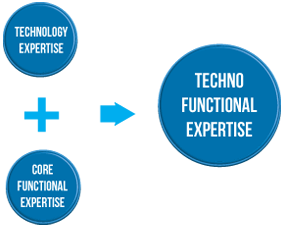

At the highest level, they can either be the most senior individual contributors, with titles such as scientist fellows or chief engineers, or, when equipped with leadership skills, they can lead their functional area in roles such as chief technological officer or chief science officer. High professionals are individuals who have the capacity and interest to continuously develop their expertise for effective performance in progressively more challenging roles within their specialties. Companies that depend on having a deep bench of expert talent to drive innovation could find that bench depleted if they fail to provide alternative reward structures and advancement opportunities for these high professionals.
FUNCTIONAL EXPERT PROFESSIONAL
High-performing professional employees into general management not only runs against their natural career orientation but also may undermine sustained growth for the organization. At Korn Ferry, business leaders who grapple with these issues often ask us questions like: “How can I develop high performers who aren’t interested in climbing the corporate ladder or managing people?” “Is there another way to get decent development investment for my experts besides designating them as high potentials?” “How can I keep my valuable, functional experts engaged?” Forcing One study found that more than two-thirds of talented, deep experts prefer a career track geared toward technical aspects of their respective area of expertise (Allen and Katz 1986). They find little to no appeal in a path that would take them out of their area of specialization.

Many specialized professionals-scientists, analysts, designers, engineers, accountants, architects, doctors, and consultants among them-are more interested in developing their professional expertise than in pursuing a general management career track. But investing in just those employees with the potential to succeed in leadership roles can be risky. Finding and developing future business leaders is and should be a critical priority for organizations. Rising up the organizational hierarchy has been the surest path to increases in status, recognition, and salary. Further, the highest rewards in business and industry traditionally have been conferred on those who assume people management–leadership responsibility. In another survey of 45 companies worldwide, 98% said they purposefully identify high potentials (Ready, Conger, and Hill 2010). In 2008, all 20 major corporations surveyed said they had high-potential programs (Silzer and Church 2009). Organizations have made an outsized proportion of direct and indirect investment in high-potential talent. 2013), often defined as those with the potential to take on an increasingly broad scope of leadership responsibilities. Instead, many organizations focus on finding, grooming, and retaining highpotential employees (Church et al.

“The world is so complex, we need people who are pretty deep,” Susan Peters, who heads GE’s executive development, has said in published interviews.ĭespite the importance of this specialized talent segment to organizations’ success, when it comes to talent management practices, professionals with high expertise are often under-emphasized.

General Electric, for example, is shifting from developing “jack of all trade” generalists to valuing subject-area expertise more. And as companies focus on their core competencies-the select things they do particularly well-to achieve strategic competitiveness, their success increasingly depends on deep levels of expertise in their workforce, not simply good management and leadership skills (Bersin 2009). With the global economy becoming fiercely reliant on knowledge, technology, and innovation, many jobs today require highly specialized talent. High professionals as overlooked talent assets.


 0 kommentar(er)
0 kommentar(er)
